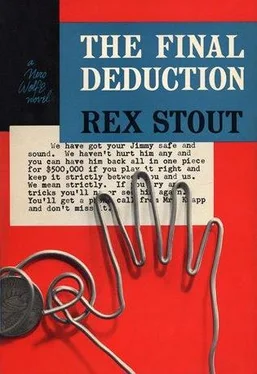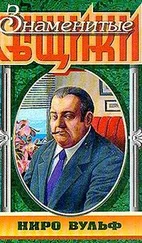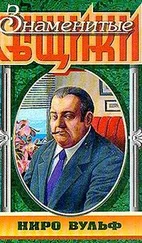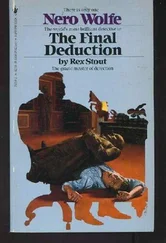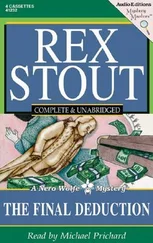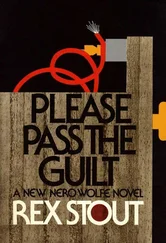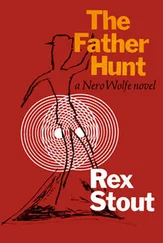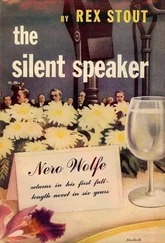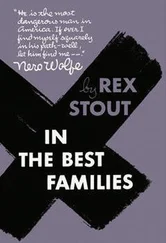Wolfe said, “Mr. Goodwin. Mr. Draper.”
Mr. Draper, having got to his feet, waited until my hand was unquestionably being offered, then extended his. Modest and reserved. His left hand went to a pocket, and I told him not to bother, but of course he did. An FBI man draws his credentials automatically, the way Paladin draws his gun. I glanced at it, not to hurt his feelings.
“Mr. Draper has been here a full hour,” Wolfe said, with the accent on the ‘full.’ “He has a copy of the statement we signed, and he has asked many questions about details. He has covered the ground thoroughly, but he wanted to see you.”
It looked like another full hour. I went to my desk and sat. Draper, back in the red leather chair, had his notebook out. “A few little questions, Mr. Goodwin,” he said. “If you don’t mind?”
“I like big ones better,” I said, “but shoot.”
“For the record,” he said. “Of course you understand that; you’re an experienced investigator. Mr. Wolfe says you left the house around half past six Tuesday evening, but he doesn’t know when you returned. When did you?”
I permitted myself a grin, modest, polite, and bland. “Mr. Draper,” I said, “I appreciate the compliment. You think I may have tailed Mrs. Vail Tuesday night, against her wishes and with or without Mr. Wolfe’s consent, and that I may even have got as far as Iron Mine Road without being spotted by one of the kidnapers. As you know, that would have been one for the books, a real honey, and I thank you for the compliment.”
“You’re welcome. When did you return?”
I gave it to him complete, from six-thirty until one o’clock, places, names, and times, going slow enough for him to get it down. When I finished he closed the notebook, then opened it again. “You drive a car, don’t you?”
“Mr. Wolfe owns it, I drive it. Sixty-one Heron sedan.”
“Where is it garaged?”
“Curran, Tenth Avenue between Thirty-fifth and Thirty-sixth.”
“Did you use the car Tuesday night?”
“No. I believe I mentioned taxis.”
“Yes. You understand, Mr. Goodwin, for the record.” He pocketed the notebook, arose, and got his hat from the stand. “You’ve been very helpful, Mr. Wolfe. Thank you very much. I doubt if we’ll bother you again.” He turned and went. I didn’t get up, because an FBI man moves fast and I would have had to jump to get ahead of him to open the door. When I heard it close I went to the hall for a look, came back, got from my pocket the paper Noel had signed, and handed it to Wolfe.
He read it and put it down. “This was called for?”
“It seemed to be desirable. Would you like a report?”
“Yes.”
I sat down and gave it to him — verbatim, all but the last half-hour with Noel, which wasn’t material. When I was through he picked up the paper, read it again, nodded, and said, “Satisfactory.” He put it down. “When your mother was in New York for a week last year, and dined here twice, and you spent some time taking her around, I saw no trace of the animus you described to Mr. Tedder.”
“Neither did I. If we find enough of that five hundred grand to make it worth telling about, and it gets printed and she reads it, she won’t mind. She understands that in this job, working for you, the more lies the merrier, even one about her. By the way, in a letter I got last week she mentioned the chestnut croquettes again.”
“Did you tell Fritz?”
“Sure. Anything for the morning?”
“No.”
“Are Saul and Fred and Orrie still on?”
“Yes.” He eyed me. “Archie. Your reply to Mr. Draper’s question. Could he have had any other reason for asking it than the chronic suspicion of an inquisitor?”
“Certainly. They might have found the tire prints of your car at Iron Mine Road. I drove it there Wednesday.”
“Don’t dodge. You have friends who would lie for you without question, and you named some of them in your reply. One particularly. How much of your reply was fact?”
“All of it.” I stood. “I’m going to bed. My ears are burning. First the FBI and now you. I wish I had tailed her, and Mr. Knapp with the suitcase; then we’d know where the cabbage is.”
It’s always possible that people who invite me to the country for a weekend will get a break; there’s a chance that there will be a development that will keep me in town, and they will neither have to put me up nor put up with me. The lucky ones that last weekend in April were a couple in Easthampton who had me booked for Friday evening to Monday morning. I have reported the developments of Friday and Saturday, and Sunday I had to stick around in case a call for reinforcements came from Saul or Fred or Orrie.
Wolfe’s routine for Sunday is different. Theodore Horstmann, the orchid nurse, has the day off and goes to visit his married sister in Jersey, so there are no regular two-hour sessions in the plant rooms. Wolfe goes up once or twice to look around and do whatever chores the situation and the weather require, but there is no strict schedule. Usually he is down in the office by ten-thirty, at least the Sundays I am there, to settle down with the review-of-the-week section of the Sunday Times , which he goes right through.
From nine o’clock on that Sunday morning I was half expecting a call from Noel Tedder to tell me that he had issued his Declaration of Independence, one hero to another, but it hadn’t come by the time I turned on the radio for the ten-o’clock news. Nor had there been any word from any of the tailers, but I was soon to know where Saul Panzer was. As I was turning the radio off the doorbell rang, and I went to the hall and saw Andrew Frost So Saul was near enough to see the door opening, no matter how Frost had got there. I swung the door wide and said good morning.
It may be cheesy writing to say that Frost’s expression and tone were frosty as he said he wanted to see Nero Wolfe, but it’s good reporting. They were. It was possible that a factor was the probability that he would have to miss church, since he was dressed for it in a custom-made charcoal-gray top-coat and a forty-dollar homburg to match. I allowed him to enter, took the hat and coat, ushered him to the office, and buzzed the plant rooms on the house phone. When Wolfe’s voice came, his usual testy “Yes?” and I told him Mr. Andrew Frost had come and had been admitted, he snapped, “Ten minutes,” and hung up. When I told Frost he made a frosty little noise and gave me a frosty look. He didn’t seem to look as much like Abraham Lincoln as he had Wednesday afternoon, but that may have been because I had never seen a picture of Lincoln simmering.
It was nearer fifteen minutes than ten when the sound came of the elevator, and Wolfe entered, a spray of Miltonia roezli in his left hand and the Sunday Times under his right arm. He takes his copy of the Times with him to the plant rooms so he won’t have to stop off at his room on the way down to the office. Labor-saving device. He stopped at the corner of his desk to face the caller, said, “Mr. Frost? How do you do. I was expecting you,” then put the flowers in the vase and the Times on the desk, and circled around to his chair.
Frost said distinctly, “You were not expecting me.”
“But I was.” Wolfe, seated, regarded him. “I invited you. I told Mr. Purcell that Mr. Vail was murdered, knowing that that would almost certainly bring you. I wished to see everyone who had been at that gathering Wednesday evening. You came, naturally, to remonstrate. Go ahead.”
A muscle at the side of the lawyer’s neck was twitching. “Are you saying,” he demanded, “that you uttered that slander, knowing it was false, merely to coerce me to come here so you could see me?”
Читать дальше
